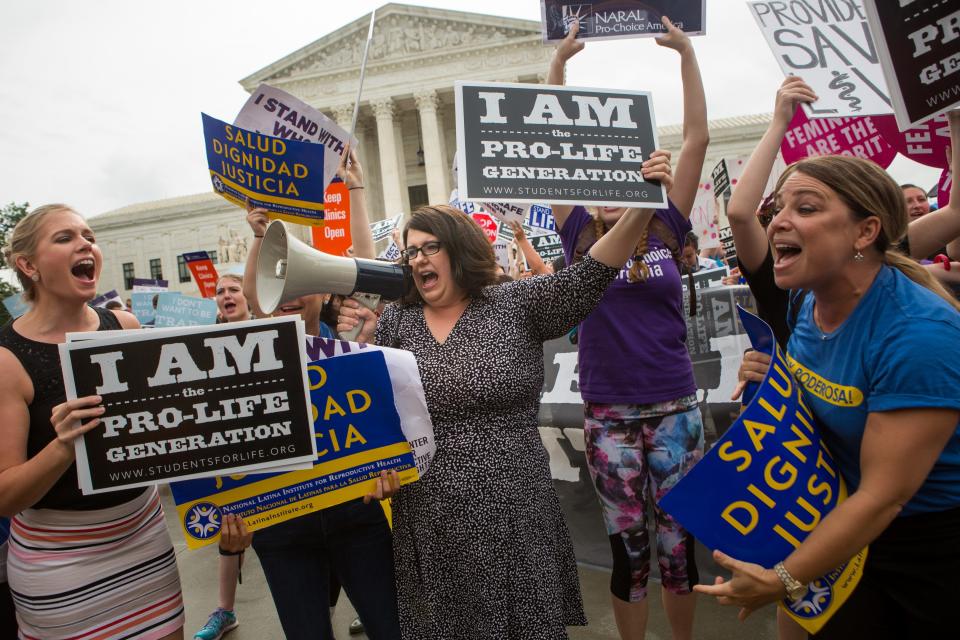Supreme Court agrees to rule on abortion restrictions, setting up contentious election year debate
WASHINGTON – Abortion is returning to the Supreme Court.
Three years after striking down restrictions on Texas clinics and doctors that had created burdens for thousands of women, the justices agreed Friday to consider a similar Louisiana law in the term beginning Monday.
That puts one of the nation's most divisive issues front and center as the 2020 presidential election approaches – and at a time when the high court itself is under a microscope following several contentious confirmation battles and rulings. A ruling in favor of Louisiana would give President Donald Trump something to show for his 2016 pledge to appoint "pro-life justices."
The high court temporarily blocked Louisiana's abortion limits last February, when Chief Justice John Roberts joined the court's four liberals in a preliminary skirmish. The law therefore is on hold until the court rules, most likely in the spring.
Abortion rights advocates had complained that the law was virtually identical to the one struck down in 2016. But that Texas decision required the vote of Associate Justice Anthony Kennedy, who retired last year and was replaced by Associate Justice Brett Kavanaugh. Roberts dissented in that case, preferring to let the Texas restrictions stand.
Abortion cases are among the most controversial to come before the court, which may be why they don't get there very often. It took almost 20 years after the 1973 Roe v. Wade decision legalizing abortion nationwide before the justices reinforced both the right to abortion and states' justification in imposing some restrictions.
Between 2000 and 2007, the court struck down a state law banning late-term abortions, then upheld a similar federal law.
The court last term upheld an Indiana law requiring the burial or cremation of fetal remains following an abortion. But it refused to consider that state's effort to ban abortions based on sex, race or disability. And in June, it refused to hear Alabama's effort to reinstate its ban against a particular second-term method of abortion.
More abortion restrictions are headed the high court's way at a time when Roberts and some of his colleagues would prefer a lower profile. Many of those would ban abortions after a certain number of weeks of pregnancy, posing a more direct challenge to the court's 1973 decision legalizing abortion.
Heading their way: Abortion cases are heading toward the Supreme Court. Can the justices avoid them for long?
Even with a 5-4 conservative majority, the court has not shown much interest in overturning Roe v. Wade. Roberts prefers a more incremental approach, and during his confirmation hearings last year, Kavanaugh referred to a series of Supreme Court rulings affirming the abortion right as "precedent on precedent."
The question in Louisiana is whether the state can require abortion providers to have admitting privileges at nearby hospitals. Three years ago, the court ruled 5-3 that the hardships for Texas women would be greater than any possible benefits of such hospital affiliations.

The Texas restrictions had threatened to close all but nine clinics capable of complying with the new standards, leaving the state unable to handle an estimated 65,000 to 70,000 abortions a year. Proponents of the Louisiana law argued that the impact there would not be as great, but critics said it threatened to leave just one abortion clinic and provider in business to serve an estimated 10,000 women.
"We remain hopeful the justices will affirm the Fifth Circuit’s decision, as we firmly believe that the facts in our case show (the law) is constitutional and consistent with our overall regulatory scheme for surgical procedures," Louisiana Attorney General Jeff Landry said in a statement.
“Louisiana is openly defying the Supreme Court’s decision from just three years ago, in which they found an identical Texas law unconstitutional,” Nancy Northup, president of the Center for Reproductive Rights, said in a statement. “We are counting on the court to follow it’s precedent. Otherwise, clinics will needlessly close, and there will be just one doctor left in the entire state to provide abortion care.”
For abortion opponents, Kavanaugh has been viewed as the crucial fifth conservative vote. He has praised former Chief Justice William Rehnquist's dissent from the Roe v. Wade decision legalizing abortion, and he dissented from his federal appeals court's 2017 decision allowing an undocumented teenager in government custody to get an abortion.
When the court put the law on hold in February, Kavanaugh wrote a dissent on his own behalf. He said the law should be implemented so that both sides could determine how many abortion clinics and providers survive the new restrictions. Hearing the case in the new term, he said then, "will take far longer and be no more beneficial than the approach suggested here."
Louisiana's statute was passed in 2014 but struck down by a federal district judge after trial three years later. It was resurrected in a 2-1 ruling by a federal appeals court panel, and the full appeals court later voted 9-6 against hearing the abortion rights group's appeal. Judges appointed by Trump all voted with the majority.
This article originally appeared on USA TODAY: Abortion: Supreme Court will hear case as presidential race heats up

